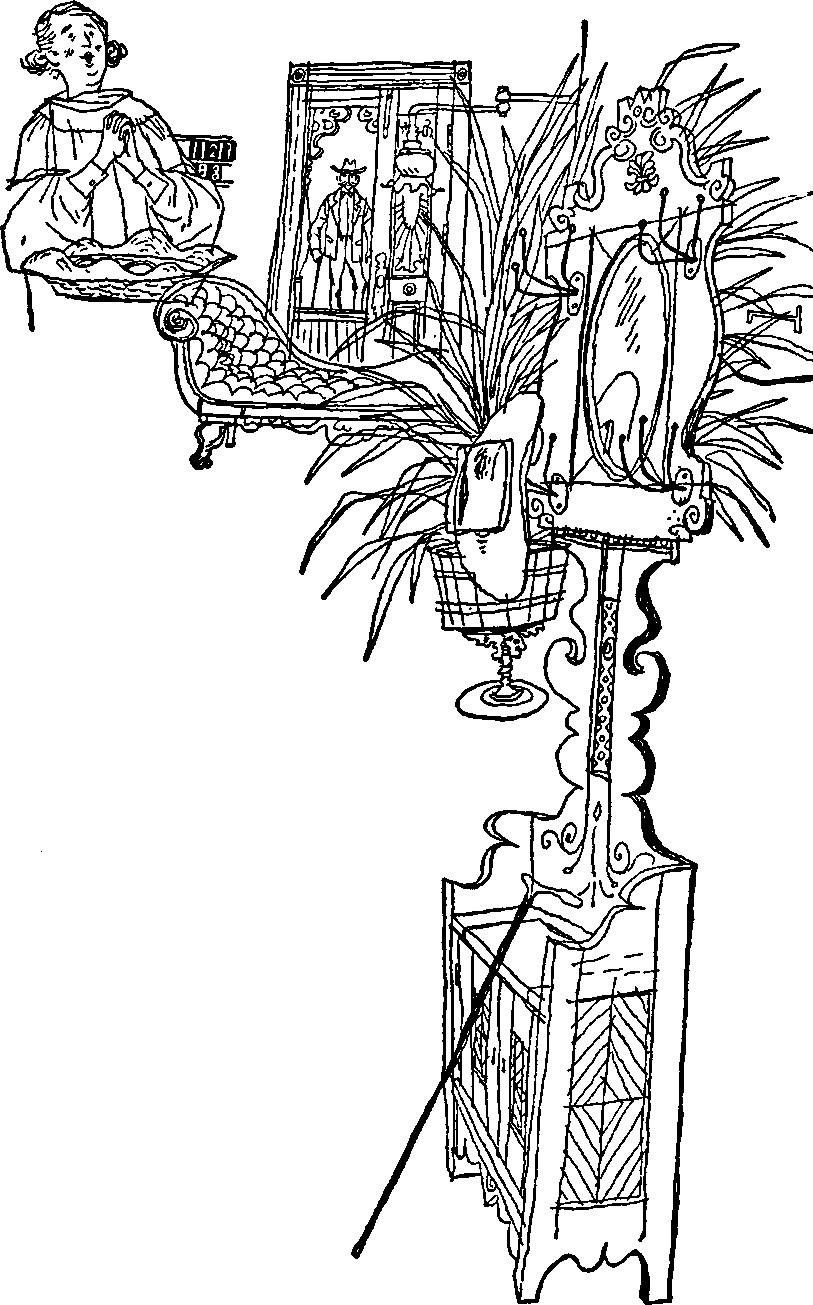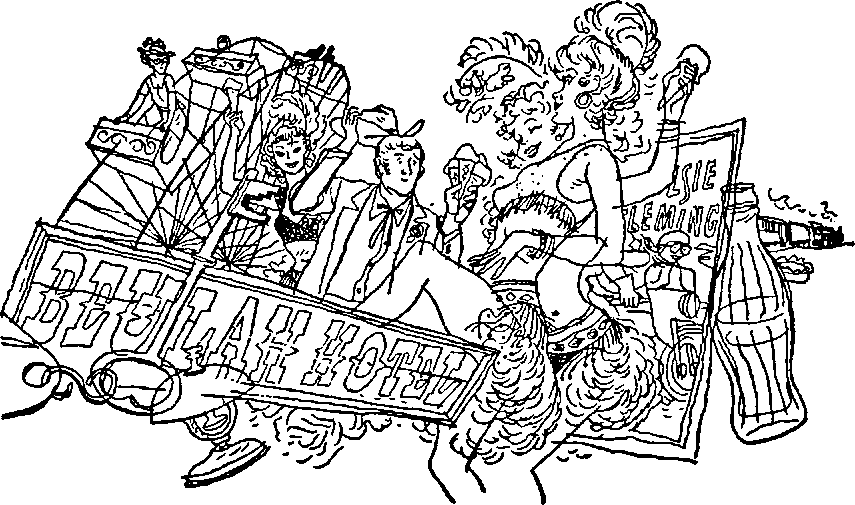The Ponder Heart
Authors: Eudora Welty

 Â
Â
Copyright 1954, 1953 by Eudora Welty
Copyright renewed 1982, 1981 by Eudora Welty
All rights reserved.
Â
For information about permission to reproduce selections from this book, write to Permissions, Houghton Mifflin Harcourt Publishing Company, 215 Park Avenue South, New York, New York 10003.
Â
Â
For permission to reprint
THE PONDER HEART,
the author wishes to thank the editors of
The New Yorker,
where it first appeared.
Â
The towns of Clay and Polk are fictitious and their inhabitants and situations products of the author's imagination, not intended to portray real people or real situations.
Â
The Library of Congress has cataloged the print edition as follows:
Welty, Eudora, 1909â
The ponder heart.
"A Harvest book."
I. Title.
PS3545.E6P7 1985 813'.52 84-22486
ISBN
0-15-672915-6
Â
eISBN 978-0-547-54392-5
v2.0912
TO
MARY LOUISE ASWELL,
WILLIAM AND EMILY MAXWELL


My Uncle Daniel's just like your uncle, if you've got oneâonly he has one weakness. He loves society and he gets carried away. If he hears our voices, he'll come right down those stairs, supper ready or no. When he sees you sitting in the lobby of the Beulah, he'll take the other end of the sofa and then move closer up to see what you've got to say for yourself; and then he's liable to give you a little hug and start trying to give you something. Don't do you any good to be bashful. He won't let you refuse. All he might do is forget tomorrow what he gave you today, and give it to you all over again. Sweetest disposition in the world. That's his big gray Stetson hanging on the rack right over your headâsee what a large head size he wears?
Things I could think of without being asked that he's given away would beâa string of hams, a fine suit of clothes, a white-face heifer calf, two trips to Memphis, pair of fantail pigeons, fine Shetland pony (loves children), brooder and incubator, good nanny goat, bad billy, cypress cistern, field of white Dutch clover, two iron wheels and some laying pullets (they were together), cow pasture during drouth (he has everlasting springs), innumerable fresh eggs, a pick-up truckâeven his own cemetery lot, but they wouldn't accept it. And I'm not counting this week. He's been a general favorite all these years.
Grandpa Ponder (in his grave now) might have any fine day waked up to find himself in too pretty a fix to get out of, but he had too much character. And besides, Edna Earle, I used to say to myself, if the worst does come to the worst, Grandpa
is
rich.
When I used to spot Grandpa's Studebaker out front, lighting from the country, and Grandpa heading up the walk, with no Uncle Daniel by his side, and his beard beginning to shake under his chin, and he had a beautiful beard, I'd yell back to the kitchen, "Ada! Be making Mr. Sam some good strong iced tea!" Grandpa was of the old school, and wanted people to measure upâeverybody in general, and Uncle Daniel and me in particular. He and Grandma raised me, too. "Clear out, you all," I'd say to who all was in here. "Here comes Grandpa Ponder, and no telling what he has to tell me." I was his favorite grandchild, besides being the only one left alive or in calling distance.
"Now what, sir?" I'd say to Grandpa. "Sit down first, on that good old sofaâgive me your stick, and here comes you some strong tea. What's the latest?"
He'd come to tell me the latest Uncle Daniel had given away. The incubator to the letter carrierâthat would be a likely thing, and just as easy for Uncle Daniel as parting with the rosebud out of his coat. Not that Uncle Daniel ever got a
letter
in his life, out of that old slow poke postman.
"I only wish for your sake, Grandpa," I'd say sometimes, "you'd never told Uncle Daniel all you had."
He'd say, "Miss, I didn't. And further than that, one thing I'm never going to tell him about is money. And don't let me hear you tell him, Edna Earle."
"Who's the smart one of the family?" I'd say, and give him a little peck.
My papa was Grandpa's oldest child and Uncle Daniel was Grandpa's baby. They had him lateâmighty late. They used to let him skate on the dining room table. So that put Uncle Daniel and me pretty close togetherâwe liked-to caught up with each other. I did pass him in the seventh grade, and hated to do it, but I was liable to have passed anybody. People told me I ought to have been the
teacher.
It's always taken a lot out of me, being smart. I say to people who only pass through here, "Now just a minute. Not so fast. Could
you
hope to account for twelve bedrooms, two bathrooms, two staircases, five porches, lobby, dining room, pantry and kitchen, every day of your life, and still be out here looking pretty when they come in? And two Negroes? And that plant?" Most people ask the name of that plant before they leave. All I can tell them is, Grandma called it Miss Ouida Sampson after the lady that wished it on her. When I was younger, I used to take a blue ribbon on it at the County Fair. Now I just leave it alone. It blooms now and then.
But oh, when the place used to be busy! And when Uncle Daniel would start on a spree of giving awayâit comes in spreesâand I would be trying to hold Grandpa down and account for this whole hotel at the same timeâand Court would fling open in session across the street and the town fill up, up, upâ- and Mr. Springer would sure as Fate throttle into town and want that first-floor room, there where the door's open, and count on me to go to the movie with him, tired traveling manâoh, it was Edna Earle this, and Edna Earle that, every minute of my day and time. This is like the grave compared.
You're
only here because your car broke down, and I'm afraid you're allowing a Bodkin to fix it.
And listen: if you read, you'll put your eyes out. Let's just talk.
You'd know it was Uncle Daniel the minute you saw him. He's unmistakable. He's big and well known. He has the Ponder headâlarge, of course, and well set, with short white hair over it thick and curly, growing down his forehead round like a little bib. He has Grandma's complexion. And big, forget-me-not blue eyes like mine, and puts on a sweet red bow tie every morning, and carries a large-size Stetson in his handâalways just swept it off to somebody. He dresses fit to kill, you know, in a snow-white suit. But do you know he's up in his fifties now? Don't believe it if you don't want to. And still the sweetest, most unspoiled thing in the world. He has the nicest, politest mannersâhe's good as gold. And it's not just because he's kin to me I say it. I don't run the Beulah Hotel for nothing: I size people up: I'm sizing you up right now. People come here, pass through this book, in and out, over the yearsâand in the whole shooting-match, I don't care from where or how far they've come, not one can hold a candle to Uncle Daniel for looks or manners. If he ever did a thing to be sorry for, it's more than he ever intended.
Oh, even the children have always reckoned he was theirs to play with. When they'd see him coming they'd start jumping up and down till he'd catch them and tickle their ribs and give them the change he carried. Grandpa used to make short work of them.
Grandpa worshiped Uncle Daniel. Oh, Grandpa in his panama and his seersucker suit, and Uncle Daniel in his red tie and Stetson and little Sweetheart rose in his lapel! They did set up a pair. Grandpa despised to come to town, but Uncle Daniel loved it, so Grandpa came in with him every Saturday. That was the way you knew where you were and the day of the week it wasâthose two hats announcing themselves, rounding the square and making it through the crowd. Uncle Daniel would always go a step or two behind, to exchange a few words, and Grandpa would go fording a way in front with his walking cane, through farmers and children and Negroes and dogs and the countryside in general. His nature was impatient, as time went by.
Nothing on earth, though, would have made Grandpa even consider getting strict with Uncle Daniel but Uncle Daniel giving away this hotel, of all things. He gave it to me, fifteen long years ago, and I don't know what it would have done without me. But "Edna Earle," says Grandpa, "this puts me in a quandary."
Not that Grandpa minded me having the hotel. It was Grandma's by inheritance, and used to be perfectly beautiful before it lost its paint, and the sign and the trees blew down in front, but he didn't care for where it stood, right in the heart of Clay. And with the town gone down soâwith nearly all of
us
gone (Papa for one left home at an early age, nobody ever makes the mistake of asking about
him,
and Mama never did hold upâshe just had me and quit; she was the last of the Bells)âand with the wrong element going spang through the middle of it at ninety miles an hour on that new highway, he'd a heap rather
not
have a hotel than have it. And it's true that often the people that come in off the road and demand a room right this minute, or ask you ahead what you have for dinner, are not the people you'd care to spend the rest of your life with at all. For Grandpa that settled it. He let Miss Cora Ewbanks run it as she pleased, and she was the one let the sign blow down, and all the rest. She died very shortly after she left itâan old maid.
The majority of what Uncle Daniel had given away up to then was stuff you could pick up and cart awayâmiscellaneous is a good word for it. But the Beulah was solid. It looked like it had dawned on Uncle Daniel about
property
. (Pastures don't countâyou can take them back by just setting their cows back on the road.) Grandpa was getting plenty old, and he had a funny feeling that once
property
started going, next might go the Ponder place itself, and the land and the crop around it, and everything right out from under Uncle Daniel's feet, for all
you
could predict, once Grandpa wasn't there to stop him. Once Grandpa was in his grave, and Uncle Daniel shook free, he might succeed in giving those away to somebody not kin or responsible at all, or not even local, who might not understand what they had to do. Grandpa said that people exist in the realm of reason that are ready to take advantage of an open disposition, and the bank might be compelled to honor thatâbecause of signatures or witnesses or whatever monkey-foolishness people go through with if they're strangers or up to something.
Grandpa just wanted to teach Uncle Daniel a lesson. But what he did was threaten him with the asylum. That wasn't the way to do it.
I said, "Grandpa, you're burning your bridges before you get to them, I think."
But Grandpa said, "Miss, I don't want to hear any more about it. I've warned him, now." So he warned him for nine years.